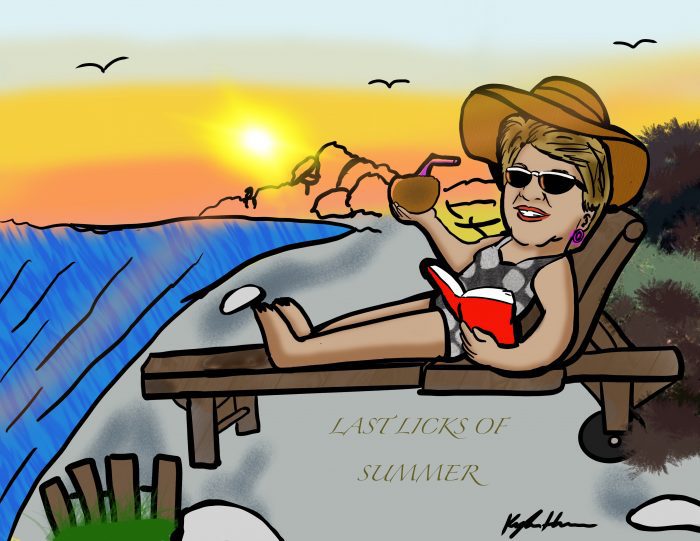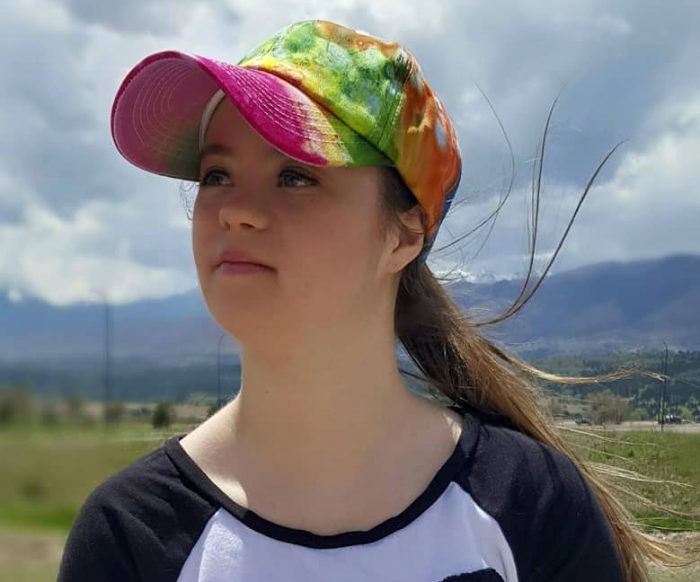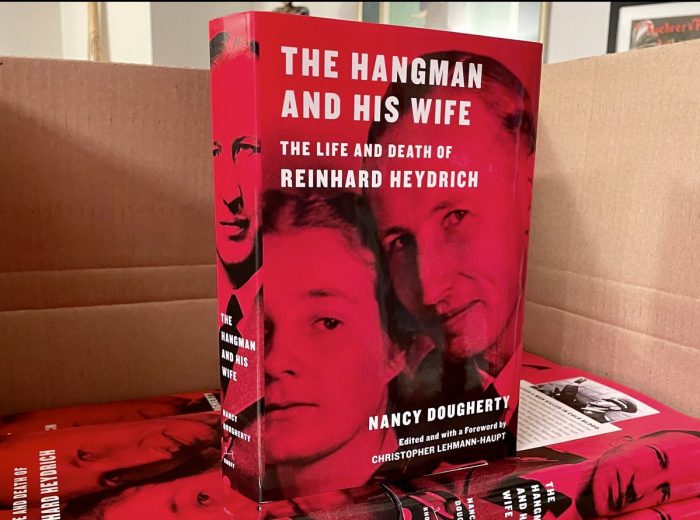ON VACATION: Leah Dunaief’s column, Between You and Me, will return next week.
Between You and Me
Between You and Me: The world is a better place for those with Down syndrome. They help make it better.
By Leah S. Dunaief

“Born to Sparkle” is a book written, to my surprise, by a young woman with Down syndrome. The rest of the book title is “A Story About Achieving Your Dreams.” A review of the book appears in our Arts and Lifestyles section on page B23 in this issue, and it tells a heartwarming story about the author, Megan Bomgaars, who is 29 and lives in Denver. In the words of our reviewer, Melissa Arnold, the book “teaches kids that all of us are unique and have something special to share with the world, and if you dream big and work hard, you can achieve anything.”
Why am I surprised? Because my sister, who was two years younger than I, also was born with Down syndrome, and like Megan, on Thanksgiving Day but 50 years earlier in 1942. While she was clever and wonderful in many ways, Maxine could never have written a book, in part because she would never have been imagined to do so. What a difference that half-century makes.
There is a broad spectrum of Down diagnoses, and Maxine was pronounced “profoundly retarded,” which surely limited expectations for her life. While Megan’s motto is, “Don’t Limit Me!”, and she has become a motivational speaker and the owner of a business, the professionals who examined my sister Maxine told my parents to institutionalize her “because she won’t live very long anyway with that condition.” She lived to be 65.
It was my sister’s bad luck to be born five decades earlier, when mental retardation was considered a stigma for a family, and the response to such a birth was to hide the innocent person. Megan Bomgaars, by comparison, shared her life’s story on television with six others in the A&E docuseries “Born This Way.” The show went on to win an Emmy in 2016.
It was my sister’s good luck to have two parents who recognized her as a fully entitled member of our family and tried to give her every advantage that existed then, which were very few. When the principal of the elementary school that I attended refused to accept her into first grade, my mother asked for the “Dick & Jane” series with which first graders were taught to read and patiently worked with my sister at home for many hours a day. Eventually, Maxine could proudly read that primer. She could also do simple arithmetic, adding and subtracting, and she was very verbal.
In fact, that was the only difficult part of life with Maxine. She talked constantly and in a loud voice, as if she were on one side of a telephone conversation. Only two things could make her quiet down: music and baseball.
Maxine would sit quietly in the back of the room while I took piano lessons from a teacher who came to the apartment. After he left and I got up, she would slide onto the piano stool and play the melodies of the different pieces I had gone over with the teacher. We’re talking here Bach, Czerny and Mendelsohn. She also adored music that she would hear on the radio, especially show tunes that she could sing. And sing she did, in a Jimmy Durante voice. One of her favorites was “Oklahoma!”
Also, she loved to listen to baseball games on the radio and watch them played on our Sunday outings with our dad to Central Park. I don’t know if she followed the intricacies of the game, but she knew when to cheer and probably loved being part of the crowd.
Megan Bomgaars loved going to school and was a cheerleader in high school. My sister also attended a school in Brooklyn that was operated by Catholic Services. A bus would pick her up, along with my mother, each day and drive them to Brooklyn. Incidentally, my mother never let her out of her sight. My parents protected Maxine from a world that could not always be kind and safe. But for Megan, a person who incidentally has Down syndrome, today society learns from her.
Between You and Me: A woman from Kenya entered my world
By Leah Dunaief

One of the reasons we travel is to broaden our horizons, literally and figuratively. Yes, we want to see new vistas, consider how others live, and cut ourselves a little break from our daily routines. The same could be said when we meet people from elsewhere. They come from different worlds, bring their personal history and cultural differences into view, and generally teach us about more than what exists in our own small circle.
Such is also the benefit of diversity. We don’t have to travel to find new worlds, we only have to be aware of others who come from those different worlds and admit them into ours.
All of which is to say that last Monday, as I went about my daily routine, I met a lovely woman from Kenya, and we had time for a leisurely talk. Now there were only three things I knew about Kenya. It is a country in Eastern Africa. A friend went with her extended family on a safari there some years ago and raved about it on her return. Runners from Kenya, both male and female, usually win the New York City Marathon. That’s it.
At least, that was it until we started to chat. Now that she raised my consciousness about her home, I realized that Kenya has been in the news lately. Elections were scheduled this past Tuesday, and they were hotly contested. This much I learned from the PBS News Hour Monday night. Because of my encounter, I paid more attention to that news segment as well as to a couple of news stories in The New York Times. She brought her country within my view.
The news stories told me more.
William Ruto, 55, the self-proclaimed leader of Kenya’s “hustler nation” [his designation], was vice president for nine years but was now portraying himself as an outsider, representing the masses of frustrated young people, most of them poor, who just want to get ahead. He paints his rivals as elitist. That would include Raila Odinga, 77, who is running for president for the fifth time but who now has made an alliance with his former bitter rival, the outgoing president, Uhuru Kenyatta, who is backing him. The race is expected to be close.
Why should we care about Kenya?
“Since its first competitive multi-party elections 20 years ago, the East African nation has emerged as a burgeoning technology hub, a key counterterrorism partner, a source of world-class athletes and an anchor of stability in a region roiled by starvation and strife,” according to the newspaper article. Some 80 % of Kenyans voted in the 2017 election, making for a democracy in the midst of nations run by strongmen.
There are major concerns now. The pandemic and the Ukrainian War have badly affected their economy, which already was struggling under heavy debt to China for financing a railroad and road projects. This was part of its trillion-dollar Belt and Road Initiative, aiming to expand China’s economic and political influence in Africa. China never has financed the completion of this construction, leaving the railroad to end abruptly in a field 200 miles short of its intended destination in neighboring Uganda. But the debt remains to be paid, and the railroad is further enmeshed in serious corruption charges. Meanwhile China is reconsidering its early investments in African infrastructure since it paid out large amounts of money to countries with shaky economies. But the Chinese government still seeks influence in Africa, as does Russia, which was supplying much of its grain.
The 54 nations and 1.4 billion people on the African continent are important enough to us that Secretary of State Antony Blinken just started a tour of countries there. His trip and the election in Kenya are more meaningful to me now, thanks to the conversation I enjoyed with the woman who may become a new friend.
Now back to travel. She enticed me to visit with a description of their magnificent sand beaches along the Indian Ocean. Travel, imagined or real, is a beautiful thing.
Between You and Me: Is hate mongering the beginning of a descent into evil?
By Leah S. Dunaief

Driving along a residential street in what seemed from doorbell videos to be a white Prius, a man tossed a plastic bag on each lawn as he moved along. It might have been a newspaper delivery, but it wasn’t. It was a package of hateful flyers whose words were directed against Jews. The bags contained rice or pebbles to weigh them down and keep them from blowing away in the wind.
Police have been investigating the hate messages delivered to homes in Rockville Centre, Oceanside and Long Beach in Nassau County and have blamed an anti-Jewish group for the activity, which has also occurred in other cities in the country. Whether these groups are aligned through the internet has yet to be determined. But we do know that the internet has carried hateful messages throughout the world, a far cry from the original idea that digital connectivity could be only a positive platform for revealing despots’ brutality in far corners of the globe.
We now know the internet can be a powerful tool to radicalize otherwise ordinary people who might be susceptible to the hateful messages. But how do ordinary people become radicalized?
A book was just published that attempts to deal historically with that subject by focusing on Reinhard Heydrich, who became the head of the SD (the intelligence service) and the Gestapo as well as an architect of the Final Solution for the Third Reich. “The Hangman and His Wife,” by Nancy Dougherty, tells of a man without ideological roots, who was not a fervent believer and only joined the Nazi Party in 1931, two years after his future wife, Lina. Yet he began what the senior New York Times book reviewer, Christopher Lehmann-Haupt, who wrote the forward to the book, described this way.
“One searches in vain for a rational explanation of Heydrich’s descent into evil. No single biological fragment satisfies.”
According to the book’s author, Heydrich evolved from a musically gifted, intelligent and lonely little boy into a monstrous, hyper-rational technocrat with a photographic memory and unmatched organizational abilities. How he was perceived may have been a starting point. He had “striking Aryan looks,” and for Heinrich Himmler, who first interviewed him, and who “was weak-chinned and squinted from behind thick glasses … a physically unimposing” figure, Heydrich fit the Nazi ideal. “For all their focus on Nordic physical perfection, the Nazi leaders were a bunch of misfits … Goering was fat and jowly; Goebbels was clubfooted.” Hitler himself did not match the paragon. Here was this tall, blond candidate for head of the SS, who would be a poster child of Aryan perfection in his new uniform. He must have loved that.
Further, a close relative had a Semitic-sounding last name, and “he was shadowed by rumors that there was Jewish blood in his family and mocked during his nine years in the navy; one former roommate attested that ‘everyone more or less took Heinrich for a Jew,’” according to author Dougherty.
And this from another bunkmate: “there is no doubt that ambition was his characteristic peculiarity … On all occasions, he wanted to be outstanding — in the service, in front of his superiors, with the comrades, in sportsmanship and in bars.” Put that together with “his Luciferian coldness, amorality and insatiable greed for power,” according to Dougherty, and he became head of the Gestapo until he died in his Mercedes convertible from an assassin’s grenade on May 27, 1942. He received a full-dress state funeral from Hitler.
So do those personal qualities plus opportunity explain the emergence of a hate monger? Could any of these bag-tossers today become deeply evil and potentially homicidal? Or are they merely practicing freedom of speech? Do they just wish to stand out and be seen? Is capacity for malignant behavior what Freud called the “death instinct?” Or, as the book reviewer, Daphne Merkin, suggests, is there an inherent perverse glamour in evil?
Between You and Me: Meet me at the bistro table in Port Jefferson … or is it in Paris?
By Leah S. Dunaief

Sitting at a bistro table on the sidewalk in Port Jefferson village this morning, sipping my coffee and people-watching, it occurred to me I could be anywhere enjoying such a scene. I was lingering on after a breakfast business meeting, and now alone, I relaxed with this thought. I could be in the many shoreline villages strung along the New England coast or any of the Atlantic fishing ports of the United States, or for that matter, those on the Pacific or the Gulf of Mexico. I could even be in Paris or Rome, although those are not portside locations.
That’s what summer will do to you. The warmth of the sun and the caressing breeze encourage daydreaming.
I saw residents walking their dogs, who, in turn, seemed more interested in what I was eating than in getting exercise. I greeted people I know, but haven’t seen in too long due to COVID, as they strolled by. A friend rolled down his window and waved on his drive up the block, calling out to me from the far lane to ask how I was. Customers at the next table started chatting with me and showing off their young baby, their first. The waitress came out to check on me and asked, “Can I get you anything more or would you just like to enjoy the moment?” Smart young woman, she understood.
 We live in a wonderful place with many delightful offerings, but we probably don’t take the time to dwell on that fact. For example, even this past Thursday alone, we could have attended the opening night of the Stony Brook Film Festival, screening indie movies from throughout the world at the Staller Center on the campus of Stony Brook University. Or we might have tapped our feet and kept time with a performance at The Jazz Loft in Stony Brook village. The Huntington Summer Arts Festival has ongoing performances, this past Thursday featuring Lakecia Benjamin & Pursuance that started at 8 p.m. in Heckscher Park.
We live in a wonderful place with many delightful offerings, but we probably don’t take the time to dwell on that fact. For example, even this past Thursday alone, we could have attended the opening night of the Stony Brook Film Festival, screening indie movies from throughout the world at the Staller Center on the campus of Stony Brook University. Or we might have tapped our feet and kept time with a performance at The Jazz Loft in Stony Brook village. The Huntington Summer Arts Festival has ongoing performances, this past Thursday featuring Lakecia Benjamin & Pursuance that started at 8 p.m. in Heckscher Park.
Also, on Thursday evening, there was the Smithtown Library concert, a lecture on the much-in-the-news sharks at the Whaling Museum in Cold Spring Harbor, a concert in the Show Mobile at Harborfront Park in the village of Port Jefferson, and in Northport Village Park the Northport Community Band continued its summer concert series. The Huntington Manor Fireman’s Fair, Long Island’s largest, started on Thursday at the Henry L. Stimson Middle School in Huntington Station.
And, as they say, so much more.
I’m not even mentioning the movie showings in the moonlight, the largesse of theaters, the art galleries, the farmers’ markets, the U-Pick opportunities, the wineries, the plethora of restaurants and opportunities for boutique shopping, and the glorious beaches to be enjoyed during the day and under the stars at night that are available at different times and days on our Island.
And try the local corn on the cob. This week it has been fabulous.
This may sound daffy to you, but when the weather becomes unbearably hot and humid, and I just want to get out on the water, I have even been known to ride the rear deck of the ferry to Bridgeport and back to Port Jefferson for a poor person’s afternoon cruise. And if you find yourself in need of a little exercise, walk the wooden pathway around Port Jefferson harbor, with or without your dog.
Next week is already August, and soon the summer will be gone, along with many of these attractions. While certainly others remain, we don’t have quite the leisure of mind to enjoy them that summer brings as the calendar turns.
Between You and Me: Could Putin’s plans be like the Russian doll, each aspect fitting within another?
By Leah S. Dunaief

Incredibly, one man has altered the world.
On Feb. 24, 2022, Russian President Vladimir Putin directed his troops into neighboring Ukraine, and the killing began. Ukrainians, Russian soldiers, mercenaries, sympathetic foreign fighters, civilians — all shot each other. Eastern Ukrainians were deported into Russia by the thousands, cities throughout Ukraine were destroyed, families were ripped apart, millions of Ukrainians fled to other countries, schools stopped, medical services halted, commerce and cultural activities were squelched, random bombings put lives in a lottery. Those are just some of the horrific consequences of Putin’s order against one country.
But the repercussions of that one act are being felt around the globe. Countries that depended on wheat and other agricultural supplies grown and shipped from Ukraine and Russia, are now frantically seeking alternate sources, if they can afford them. Oil and gas, primarily piped from Russia and Ukraine, have been cut off. Exports of hundreds of other products from these two countries have stopped. Oil and gas prices have skyrocketed, leading the way to global inflation. Nations have realigned geopolitically and militarily or strengthened their defense pacts by sending troops and weapons to allies. And other campaigns, to control climate change and suppress the coronavirus, have diminished as national budgets are modified.
What does Putin want?
There has been much speculation about his goals and his fears. They may have crystalized during these ensuing months, or Kremlin watchers may have caught on. One such scholar, who writes about Russia’s politics, foreign policy and, for a score of years, has studied Putin’s behavior, has put forth a cogent scenario in this past Tuesday’s The New York Times. Tatiana Stanovaya believes that Putin has a grand scheme whose goals are threefold.
The first is the most pragmatic: the securing of a land bridge through the Donbas region of the southeast to Crimea. Russian troops seem to have already captured Luhansk, which is part of the Donbas. Apparently, Putin believes the West will accept that Russian troops cannot be dislodged from there and will not cross any red lines to directly engage in such a military effort, eventually abandoning the idea and the territory to Russia.
The second goal is to force Kyiv and the Zelensky government to capitulate from exhaustion and demoralization after one or two years. Russia would then launch a “Russification” of the country, erasing Ukrainian culture and nationhood and imposing Russian language, culture and education. Thus Russia would have expanded its territory and stopped NATO from reaching Russia’s current borders.
The third goal is the most ambitious: Putin wants to build a new world order. “We are used to thinking that Mr. Putin views the West as a hostile force that aims to destroy Russia,” according to writer Stanovaya. “But I believe that for Mr. Putin there are two Wests: a bad one and a good one.”
The “bad” one is the one currently in power and led by elites who are “narrow-minded slaves of their electoral cycles who overlook genuine national interests and are incapable of strategic thinking.” And the “good West”? He believes that “these are ordinary Europeans and Americans who want to have normal relations with Russia and businesses who are eager to profit from close cooperation with their Russian counterparts.”
Today, Putin is convinced, the bad West is declining while the good West is challenging the status quo with nationally oriented leaders like Viktor Orban in Hungary, Marine Le Pen in France, and Donald Trump, “ready to break with the old order and fashion a new one.”
The war against Ukraine, with its undesirable consequences like high inflation and soaring energy prices, “will encourage the people to rise up and overthrow the traditional political establishment.” This fundamental shift will then bring about a more-friendly West that will meet the security demands of Russia.
If that has a familiar echo, it is not so different from the Communist expectation that the proletariat will rise up and embrace Marx and Lenin. We know how that turned out.
Between You and Me: Flying high at my house
By Leah S. Dunaief

It was an ominous sound. Behind the closed glass doors of our fireplace, there seemed to be a fluttering. It must be an odd gust of wind, I hoped. Deep down, I knew it wasn’t. On closer but timid examination, I could make out the frantic beating of the wings of a bird that had somehow fallen down the chimney and was struggling to escape.
What to do?
If I opened the fireplace doors and the door to the back deck, would the bird immediately fly through the living room and out of the house? I doubted that. It was probably dazed and disoriented and would buzz around the ceiling, wildly flapping its wings. How could I steer it in the right direction? Maybe with a broom? Would it think I was attacking and peck at me?
When in doubt about any of life’s challenges, I often consult the support system of my office staff. I called, explained the situation to our always patient receptionist, and was immediately transferred to the member of the art department who most often deals with suburban wildlife.
“Get a small towel, open the fireplace doors a crack and see if you can catch the bird in the towel as it tries to fly out. You can carry it to the outside door and let it loose,” she suggested. Then, because she is a wonderfully generous human being, she asked if I wanted her husband to stop by.
I declined the offer, thanked her and did as she directed, nervously opening the doors a little and peering inside. At this point, the bird was lying on its side, under a low brick that protruded from the back of the fireplace. I was afraid it was dead. But then, it stood up and again began to flutter its wings. The probability of catching it in the towel seemed remote.
I closed the doors, went to the phone and called my friendly and helpful exterminator. “We don’t really do that kind of work,” he said with surprise. “But I can recommend a wildlife rescue person.” I’ll text you his phone number as soon as I can find it.” With that, he got off the phone, leaving me alone with a bird in my chimney.
I needed to mobilize. I called my neighbor, even though I knew she was terrified of birds in the house from a nasty experience she had as a child. Good soul that she is, she came right over and viewed the situation. The bird was definitely alive and fluttering. Poor thing. The count was now two nervous women and one nervous bird. Perhaps the most nervous was my friend.
I checked my texts, found the recommendation for the rescuer and immediately called. “I’ll be glad to help you out,” he said. “Where do you live?” When I told him, he assured me that he was nearby and could get there in just a few minutes. “My price is $150 for the visit and $100 to remove the bird,” he informed me. That gave me serious pause. “Um, I’ll call you back,” I said. “OK,” he replied and hung up.
I looked at my friend, who had heard the conversation, and who now looked back at me with a strange light in her eyes. “Are your plastic gloves still in the bottom drawer? she asked. Dashing into the kitchen, she reappeared, pulling on the gloves. To my surprise, she opened the doors, climbed into the fireplace, gently lifted the bird from under brick, ran across the room to the open door and put it down on the outside table. It stood still. We brought water and put the aluminum plate on the far side of the table. It still didn’t move, just watched us as we watched it. Then, as we started to move, it took off and flew away.
We cheered loudly, both for the bird and for my neighbor. She had managed to overcome her intense fear in order to preserve a life and also to save my purse.
Between You and Me: Remember that bit about pledging our sacred Honor?
By Leah S. Dunaief

“Are you worried about what’s going to happen to our country?”
This question was posed to me by a younger person I know. He was clearly worried by current events, and with good reason. Our nation is facing a number of serious problems, and, in fact, so is most of the rest of the world.
His question made me think back to some of the chaotic times I remember. Polarization is a painful word being used to describe the United States today, but there were other times in my short lifetime when our country was seriously divided.
I have an early memory of signs hanging in our apartment house elevator. “Impeach Truman,” they urged. I don’t think I knew what they meant, but people on the streets were heatedly saying the same thing. I knew Truman was president, but I certainly did not know anything about impeachment, and I had never before heard of Douglas McArthur, who had been relieved of his command in the Far East for disagreeing with Truman over Korean War tactics. That was a time of polarization, and tensions were high, even in my neighborhood of New York City. The Chicago Tribune editorialized, “The American nation has never been in greater danger.”
Our country moved on.
Everyone who was alive in the 60s well remembers the torments of that decade. Both Kennedy and Martin Luther King were assassinated, civil rights legislation drove friends apart, the Vietnam War caused endless demonstrations and riots, and the Democratic National Convention in Chicago in 1968 was a frightful militarized spectacle epitomizing the nation’s divisions and chaos. It seemed our nation was being torn apart. People wondered if the country would survive.
Our country moved on.
There was Watergate in the 70s and a president of the United States was forced to resign. There were long lines at the gas pumps and wild inflation with stagnation and American hostages in Iran.
Our country moved on.
You get the point. Severe problems have always periodically challenged America, our stability and our way of life. There have been those with evil intent and there have been true heroes. We have been challenged regularly, we have come together and we have moved on.
July 4th, we celebrated our independence, and the flag that belongs to all of us. In our small town America, up and down the Island, we paraded together, fire departments and police departments, conservatives and liberals, Blacks and whites and Latinos and Asians, gay and straight, lifers and choicers. We did so as Americans, proud of our nation despite its many faults, recognizing that we can make our country better even as we cheer the exceptionalism that makes immigrants risk and sometimes lose their lives to get here.
If you read through the Declaration of Independence, as I did this past weekend, you will see the values that bind us together. We must not lose, in the struggles to find our way forward today, the respect in the ending sentence:
“And for the support of this Declaration, with a firm reliance on the protection of divine Providence, we mutually pledge to each other our Lives, our Fortunes and our sacred Honor.”
Let us then start our healing not by putting power over country but by pledging to each other our sacred Honor. That will help unite us, to truly hear each other, and together we can move on. We always have, and together, we always will.
Between You and Me: Optimism and joy make for long lives
By Leah S. Dunaief

Women need some good news right about now, after the Roe decision, and here it is: Women are more likely to live past 90. But there is a caveat. We have to be optimistic. Now, don’t poo poo this statement. It comes from a large study by researchers at Harvard University and was published in the Journal of the American Geriatrics Society.
Entitled, “Optimism, Lifestyle and Longevity in a Racially Diverse Cohort of Women,” the study deals with 26 years of data from almost 160,000 women between the ages of 50 and 79. All the participants were selected for their optimism with quantitative measures of testing. Researchers found that the top quarter of the women in the study with the most positive outlook would probably live 5.4% longer than the least optimistic 25% of participants. Further, the more optimistic women were 10% more likely to live past the age of 90 than the least optimistic cohort.
The link between optimism and longer lifespan could be seen across racial and ethnic groups. “Optimism may be an important asset to consider for promoting health and longevity in diverse populations,” states the article. Non-Hispanic White, Black, Hispanic/Latina and Asian, American Indian and Alaskan native women were in the group.
“A high proportion (53%) of the women [in the optimism group] achieved exceptional longevity,” according to the study. “Higher optimism was associated with longer lifespan and a greater likelihood of achieving exceptional longevity overall and across racial and ethnic groups. The contribution of lifestyle to these associations was modest. Optimism may promote health and longevity in diverse ethnic and racial groups. Future research should investigate these associations in less long-lived populations,” concludes the Journal. Francine Grodstein, ScD and Laura D. Kubzansky, PhD, were the principal researchers of the study.
Interestingly, of those tested, women with higher optimism levels were more frequently non-Hispanic White with higher education levels.
This study also suggests that optimism is “just as important as exercise when it comes to longevity.” The researchers found this to be true even when other factors like depression, chronic health conditions and racial, social and economic background were taken into account. So a positive outlook on life may be just as important as fitness—or so lazy optimists would like to believe, and based on this large study, they may be right.
Stress, on the other hand, can take a toll on mental and physical health. According to an article in this past Tuesday’s New York Times, “certain types of stress can even age your immune system.” In a study involving 5700 adults aged 50 and over, stresses like job strain, stressful life events, every day or lifetime discrimination (including sexism or ageism) and traumatic life events were cross referenced with immune cell counts from participants’ blood. Simple aging is also a stress on the immune system.
One way to prevent or minimize immune cell aging may be to minimize or do away with unhealthy habits like smoking and drinking. But all kinds of stress, we intuitively know, can effect physical health.
How do we help ourselves further reduce stress?
Taking stock of our emotions is a good place to start. Knowing and acting on what brings us joy and where we can find social support can help. “That may mean pursuing hobbies, spending time with loved ones, or unplugging from work or social media when you can,” suggests Hannah Seo, writing for the NYT. “Mindfulness practices, exercise and healthy eating habits can also help you feel good physically, which in turn can make you feel good mentally,” according to Renee Eddy, a New York City psychotherapist, quoted in the NYT.
My best defense against stress is having social support from family and friends. My son, daughter-in-law and grandson recently visited for four days, and just interacting with them was a joy. My friends call and just chatting leaves me feeling happy, not to mention more informed.
Stresses can negatively affect longevity. Joy and optimism, we are told by current research, can increase lifespan.
Between You and Me: Come with me on a short bit of time travel
By Leah S. Dunaief

Ah! It’s summer.
Yes, there are miserable things happening that we are accosted with in the daily news briefs: congressional hearings, COVID numbers, climate change, warfare, inflation, gasoline price spikes, and so forth. But there is something magical about summer. Maybe it’s a carryover from our school days, when classes and homework ended and we could think about a trip to the beach or lounging in bed in the mornings, that make us feel the specialness of the season.
Come with me, then, as we do some time travel to my elementary school years, and I tell you what summers were like for me.
From first to fifth grades, my mother would visit my teachers in mid-May and get their lesson plans for the rest of the semester and the beginning of the next. She would then take me out of school, and I would not return until mid-September. We would travel to some rustic shack in the Catskill Mountains, a different one each year, where we would spend sixteen weeks in “the fresh air.”
My parents, you see, did not appreciate urban living in the summer, when I recall it used to get hotter than now. Air conditioning only existed in movie theaters, ice cream could only be purchased in bulk from drug stores with freezers, and to get a breeze, one would have to drive really fast along Manhattan’s East Side Highway with all the windows open—that is if one were lucky enough to get a ride in a car.
My dad grew up in the mountains, my mom in Corona, Queens, which she said was so countrified that there were cows on the road when she walked to public school. They keenly felt the inevitable pollution in the summer air and planned the escape for us children and my mom.
It was lonely for me, fresh air not withstanding I would read a lot. Generally, there would be a farm or two within walking distance, and only occasionally was there a child to play with, only my sister, who was two years younger and had Down Syndrome. But my dad and sometimes my much older brother would come up and stay with us on the weekends, and then the pace of life would pick up.
My dad and I would traipse across meadows and climb hills, for the exercise and just for the fun. Sometimes we would see cows grazing, and they would look at us lazily as we went by. My dad always reminded me to stay alert for the presence of a bull and also to watch out for any snakes that might be sunning themselves at the base of the low stone walls that separated the meadows. Should we see a bull in the distance, we should look to climb a nearby tree.
Often we would find wild blueberry bushes, and we carried containers to bring some back to the rest of the family. We picked the berries in the classical way: one for the pot, two for the mouth, one for the pot, two for the mouth. As we moved around each bush, I enjoyed the warm sun on my back and the smell of wheat and grass carried by the soft breezes that caressed us on their way past.
When it was time to return, I would wait for his suggestion that I lead the way, and it always came. My dad hoped I would develop a good sense of direction, especially when the terrain looked the same all around us. He would show me nature’s clues, like moss growing on the north side of tree trunks, as a help to finding my way.
One time I remember getting up early enough to watch the sun rise from the top of the nearby hill. I had never seen the sun rise before then, but the real treat was just being with my dad.














